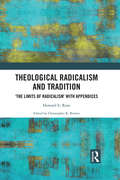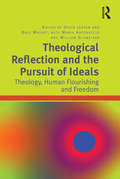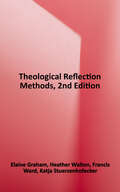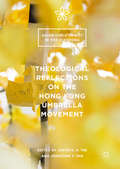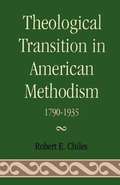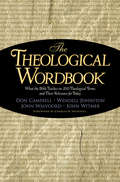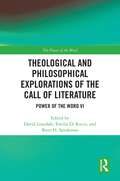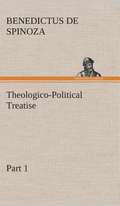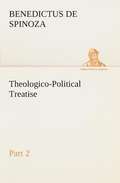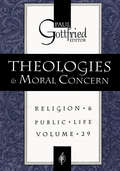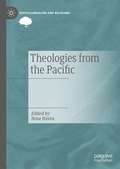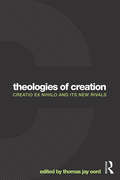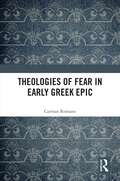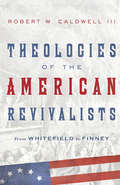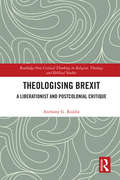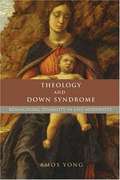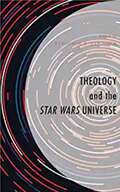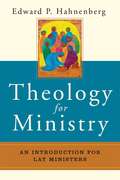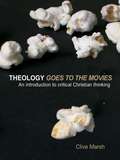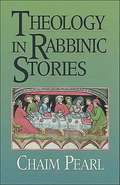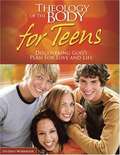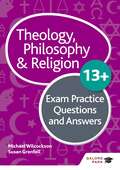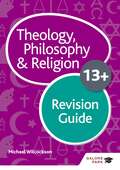- Table View
- List View
Theological Radicalism and Tradition: 'The Limits of Radicalism' with Appendices
by Howard E. Root‘The limits of radicalism are those which end not in chaos but in the breaking of fresh ground.’ Howard E. Root Previously unpublished––and only recently rediscovered by Dr Christopher R. Brewer in an uncatalogued box in the archives of Lambeth Palace Library––Canon Howard E. Root’s 1972 Bampton Lectures, ‘The Limits of Radicalism’, have to do with nothing less than ‘what theology is’, a topic no less relevant today than it was in 1972. Against the radical reductionism of his time, Root defended the integrity of theology and ‘theological truth’. Advocating a ‘backward-looking’ radicalism, he thought that tradition should display ‘recognisable continuity’, and yet at the same time––against reductionistic tendencies––that it might be enriched and enlarged via a wide variety of ‘additive imagery’ including, though not limited to, poetry and pop art, music and even television. We must ‘begin where we are’, said Root, for we cannot, in the manner of Leonard Hodgson, ‘think ourselves into the minds and feelings of men 2000 years ago.’ In this volume, which begins with a substantial, mostly biographical introduction, Dr Brewer argues that Root––a backward-looking radical who defended metaphysics and natural theology, and insisted that theologians look to the arts as theological resources––anticipates the work of David Brown and others concerned with tradition and imagination, relevance and truth. A fascinating glimpse into the recent history of British Christianity, Root’s lectures, as well as the related appendices, are essential reading for theologians interested in the dynamics of a developing tradition and the theme of openness, as well as those with a particular interest in 1960s Cambridge radicalism and the British reception of the Second Vatican Council.
Theological Reflection and the Pursuit of Ideals: Theology, Human Flourishing and Freedom
by Dale Wright Maria AntonaccioContemporary thought is marked by heated debates about the character, purpose and form of religious thinking and its relation to a range of ideals: spiritual, moral, aesthetic, political and ecological, to name the obvious. This book addresses the interrelation between theological thinking and the complex and diverse realms of human ideals. What are the ideals appropriate to our moment in human history, and how do these ideals derive from or relate to theological reflection in our time? In Theological Reflection and the Pursuit of Ideals internationally renowned scholars from a range of disciplines (physics, art, literary studies, ethics, comparative religion, history of ideas, and theology) engage with these crucial questions with the intention of articulating a new and historically appropriate vision of theological reflection and the pursuit of ideals for our global times.
Theological Reflection: Methods
by Elaine Graham Heather Walton Francis WardWidely regarded as a classic textbook on theological reflection.- Offers new updated bibliography and updated examples, ensuring its value as a core textbook in the field for years to come.- a best-selling title for SCM Press, and required reading for numerous modules on the subject. theological Reflections: Methods, Offers a comprehensive collection of models of theological reflection. By bringing this diverse collection together in one place, the editors create a unique reference work that allows a clear and visible contrast and comparison as each model is treated formally and in a standard format. Throughout each chapter the distinguishing features of the model are examined, the geneology and origins are discussed, worked examples of the model applied to contemporary theology are provided, and critical commentary, future trends and exercises, and questions are provided. Now firmly established as an essential text on theological reflection, this new edition has been revised and updated with a new introduction, updated examples, and refreshed bibliographies
Theological Reflections on the Hong Kong Umbrella Movement
by Justin K.H. Tse Jonathan Y. TanThis book gathers the voices of four local Hong Kong theologians to reflect on the 2014 democracy protests in the city from the perspectives of Catholic social teaching, feminist and queer intersectionality, Protestant liberation, and textual exegesis. The volume also includes an extended primer on Hong Kong politics to aid readers as they reflect on the theology underlying the democracy protests. September 28, 2014 is known as the day that political consciousness in Hong Kong began to shift. As police fired eighty-seven volleys of tear gas at protesters demanding "genuine universal suffrage" in Hong Kong, the movement (termed the "Umbrella Movement") ignited a polarizing set of debates over civil disobedience, government collusion with private interests, and democracy. The Umbrella Movement was also a theological watershed moment, a time for religious reflection. This book analyzes the role that religion played in shaping the course of this historic movement.
Theological Transition in American Methodism: 1790-1935
by Robert E. ChilesReprinted from the 1965 Abingdon Press edition, this historical study traces the changes that have taken place in Wesleyan theology in America. Focuses on three representative theologians: Richard Watson, John Miley and Albert Knudson; and three central themes of revelation, sin, and grace. Of interest to ministers, theologians and seminary students.
Theological Wordbook
by Donald CambellStimulating theology is an oxymoron for most people. "Theology" sounds like something for the severely intellectual, full of complicated ideas that escape the typical Christian reader.In reality, theology is meant to enhance our understanding of God. Most of the words that make up the Christian vocabulary are common words, drawn from the realities of life, and therefore are easily applicable to real life. Based on this premise four leading authors have come together to create this excellent volume.The Theological Wordbook tackles tough words, such as propitiation, regeneration, righteousness, and predestination, but it does so in a natural, plain-spoken manner designed to be enlightening rather than evasive. Also literally dozens of words you are likely to use every day, such as forgiveness, mind, peace, rest, family, truth, and guilt, have profound biblical value. Using The Theological Wordbook can enable you to more fully appreciate what the Bible teaches on these crucial topics and how each of these terms is relevant for life today.As this happens, your understanding of God will expand. And as the words you use, speak, and hear in the community of faith become more familiar, you will become more connected to your own spiritual heritage.The Theological Wordbook is the link between understanding God's Word in your head and accepting it in your heart.
Theological and Philosophical Explorations of the Call of Literature: Power of the Word VI (The Power of the Word)
by David Lonsdale Emilia Di Rocco Brett H. SpeakmanThis book explores the ‘call’ of literature, for both writers and their audiences, and reflects on how literary works have informed and drawn from – and continue to inform and draw from – theology, philosophy and sacred scripture. Key questions addressed include the following: How do creative writers and critics conceive this call? What does it mean to speak of a ‘vocation’ to write and what have theologians and philosophers got to say on the matter? Is the spirit of literature always or necessarily an ‘angel of light’? Or is the call of literature a siren song? The essays by an international and interdisciplinary range of contributors discuss the work and testimony of writers from William Blake, Gerard Manley Hopkins and R.S. Thomas to James Joyce, Virginia Woolf and Michel Houellebecq. Also examined are the ideas and influence of figures such as John Henry Newman, who wrote that the importance of literature stems from our very nature and God-given powers as human beings, especially language. This latest volume from The Power of the Word Project will be of interest to scholars from theology, philosophy and literature.
Theological-Political Treatise
by Michael Silverthorne Benedict De Spinoza Jonathan IsraelSpinoza's Theological-Political Treatise (1670) is one of the most important philosophical works of the early modern period. In it Spinoza discusses at length the historical circumstances of the composition and transmission of the Bible, demonstrating the fallibility of both its authors and its interpreters. He argues that free enquiry is not only consistent with the security and prosperity of a state but actually essential to them, and that such freedom flourishes best in a democratic and republican state in which individuals are left free while religious organizations are subordinated to the secular power. His Treatise has profoundly influenced the subsequent history of political thought, Enlightenment 'clandestine' or radical philosophy, Bible hermeneutics, and textual criticism more generally. It is presented here in a new translation of great clarity and accuracy by Michael Silverthorne and Jonathan Israel, with a substantial historical and philosophical introduction by Jonathan Israel.
Theologies and Moral Concern
by Paul GottfriedThis is the twenty-ninth volume in This World, a series on religion and public affairs. It focuses on theological and moral questions of deep significance for our time. The lines of division separating secular and religious outlooks, modernity and postmodernism, and romantic and classical styles of thought are some of the topics treated in this volume. Additional features are an exchange of opinions and a position paper intended to generate further discussion. This ongoing series of volumes seeks to provide a wide-ranging forum for differing views on religious and ethical considerations.Theologies and Moral Concern include the following major contributions: "Distinctions of Power: How Church and State Divide America" by Brian Mitchell; "Beyond the Impasses: Making Moral Sense of Abortion" by Anthony Matteo; "Are Religions Ever Traditional" by Jacob Neusner; "Philosophical Issues in Darwinian Theory" by Kenneth T. Gallagher; "Monotheism and Skepticism" by Aryeh Botwinick; "Defining Romantic Theology" by Gerhard Spiegler; and "The YMCA and Suburban America" by Clifford Putney. In addition, the volume features a dialogue between Michael A. Weinstein and Paul Gottfried on what constitutes the proper role for liberal arts education in contemporary American society as well as a position paper titled "The Pitfalls of Political Correctness" by Lawrence Nannery.Theologies and Moral Concern is part of an annual survey of religion and public life which aims to provide relevant information and ideas about significant issues of the day. It is directly pertinent to understanding the connection between religion and the state. This particular volume, coming at a time of intense public scrutiny of fundamentalism, evangelicism, and new religious movements generally, should have special appeal for political scientists, American studies specialists, sociologists, and those involved in the creation of public policy.
Theologies from the Pacific (Postcolonialism and Religions)
by Jione HaveaThis book offers engagements with topics in mainline theology that concern the lifelines in and of the Pacific (Pasifika). The essays are grouped into three clusters. The first, Roots, explores the many roots from which theologies in and of Pasifika grow – sea and (is)land, Christian teachings and scriptures, native traditions and island ways. The second, Reads, presents theologies informed and inspired by readings of written and oral texts, missionary traps and propaganda, and teachings and practices of local churches. The final cluster, Routes, places Pasifika theologies upon the waters so that they may navigate and voyage. The ‘amanaki (hope) of this work is in keeping talanoa (dialogue) going, in pushing back tendencies to wedge the theologies in and of Pasifika, and in putting native wisdom upon the waters. As these Christian and native theologies voyage, they chart Pasifika’s sea of theologies.
Theologies of Creation: Creatio Ex Nihilo and Its New Rivals
by Thomas Jay OordHumans have long wondered about the origin of the universe. And such questions are especially alive today as physicists offer metaphysical theories to account for the emergence of creation. Theists have attributed the universe’s origin to divine activity, and many have said God created something from absolute nothingness. The venerable doctrine of creatio ex nihilo especially emphasizes God’s initial creating activity. Some contributors to this book explore new reasons creatio ex nihilo should continue to be embraced today. But other contributors question the viability of creation from nothing and offer alternative initial creation options in its place. These new alternatives explore a variety of options in light of recent scientific work, new biblical scholarship, and both new and old theological traditions.
Theologies of Fear in Early Greek Epic (Routledge Monographs in Classical Studies)
by Carman RomanoThis book explores the theological significance of horror elements in the works of Hesiod and in the Homeric Hymns for the characters within these poems, the mortal audience consuming them, and the poet responsible for mythopoesis.Theologies of Fear in Early Greek Epic argues that just as modern supernatural horror fiction can be analyzed to reveal popular conceptions of the divine, so too can the horrific elements in early Greek epic. Romano develops this analogy to show how myth-makers chose to include, omit, or nuance horror elements from their narratives in order to communicate theological messages. By employing methodological approaches from religious studies, classical studies, and literary studies of supernatural horror fiction, this book brings a fresh perspective to our understanding of how the Greeks viewed their gods and how poets helped to create that view.Theologies of Fear in Early Greek Epic will be of interest to scholars in classical studies, religious studies, and comparative literature, as well as students in courses on myth, religion, and Greek culture and society.
Theologies of the American Revivalists: From Whitefield to Finney
by Robert W. Caldwell IIIFor centuries, revivals—and the conversions they inspire—have played a significant role in American evangelicalism. Often unnoticed or unconsidered, however, are the particular theologies underlying these revivals and conversions to faith. With that in mind, church historian Robert Caldwell traces the fascinating story of American revival theologies from the First Great Awakening through the Second Great Awakening, from roughly 1740 to 1840. As he uncovers this aspect of American religious history, Caldwell offers a reconsideration of the theologies of figures such as George Whitefield, Jonathan Edwards, John Wesley, Joseph Bellamy, Samuel Hopkins, and Charles Finney. His scope also includes movements, such as New Divinity theology, Taylorism, Baptist revival theology, Princeton theology, and the Restorationist movement. With this study, we gain fresh insight into what it meant to become a Christian during the age of America's great awakenings.
Theologising Brexit: A Liberationist and Postcolonial Critique (Routledge New Critical Thinking in Religion, Theology and Biblical Studies)
by Anthony G. ReddieThis book offers a comprehensive analysis of the theological challenge presented by the new post-Brexit epoch. The referendum vote for Britain to leave the European Union has led to a seismic shift in the ways in which parts of the British population view and judge their compatriots. The subsequent rise in the reported number of racially motivated incidents and the climate of vilification and negativity directed at anyone not viewed as ‘authentically’ British should be a matter of concern for all people. The book is comprised of a series of essays that address varying aspects of what it means to be British and the ways in which churches in Britain and the Christian faith could and should respond to a rising tide of White English nationalism. It is a provocative challenge to the all too often tolerated xenophobia, as well as the paucity of response from many church leaders in the UK. This critique is offered via the means of a prophetic, postcolonial model of Black theology that challenges the incipient sense of White entitlement and parochial ‘nativism’ that pervaded much of the referendum debate. The essays in this book challenge the church and wider society to ensure justice and equity for all, not just a privileged sense of entitlement for some. It will be of keen interest to any scholar of Black, political and liberation theology as well as those involved in cultural studies from a postcolonial perspective.
Theology And Down Syndrome: Reimagining Disability In Late Modernity
by Amos YongWhile the struggle for disability rights has transformed secular ethics and public policy, traditional Christian teaching has been slow to account for disability in its theological imagination. Amos Yong crafts both a theology of disability and a theology informed by disability. The result is a Christian theology that not only connects with our present social, medical, and scientific understanding of disability but also one that empowers a set of best practices appropriate to our late modern context.
Theology And The Star Wars Universe (Theology, Religion, And Pop Culture Ser.)
by James F. McGrath John C. McDowell Shaun C. Brown Abdallah Rothman Benjamin D. Espinoza Josiah Brock Nettie Brock Edward Dunar Ryan G. Duns Nathan Garcia Russell P. Johnson Robert Keeley Bethany Keeley-Jonker Rostislav K 367 Rka Andrew J. Kuzma Jonathan Lyonhart Tim Posada Zachary B. SmithScholars have been arguing for years that Star Wars is more than light sabers, Wookies, Millennium Falcons, and troubling familial relationships. Star Wars is an exciting space fantasy that we can explore from multiple academic perspectives, such as philosophy and psychology. This volume adds to that conversation by asking, “what would it look like if we analyzed the Star Wars universe theologically?” In Theology and the Star Wars Universe, contributors from various theological traditions take on this task by exploring the nature of the Force, the spiritual role of the Jedi, nonviolent and liberationist readings of the Franchise, and the enduring power of hope. Written for the restless, curious academic but accessible to diehard fans, Theology and the Star Wars Universe is an exciting foray into the study of theology and popular culture.
Theology For Ministry: An Introduction For Lay Ministers
by Edward P. HahnenbergTheology for Ministry is for beginning ministry students, seasoned lay leaders, and anyone in between who wants to learn more about the faith that feeds their call to serve. Six easy-to-red chapters introduce the main areas of theology that every lay minister ought to know: the notion of vocation, the doctrine of God, Jesus Christ, the Holy Spirit, church, and ministry. By sharing personal stories and simple examples, Edward Hahnenberg brings the Bible to life and dusts off ancient church doctrines -- revealing the many ways our tradition can inspire the work of lay ministers today.
Theology Goes to the Movies: An Introduction to Critical Christian Thinking
by Clive MarshDrawing a comparison between religion and cinema-going, this text examines a range of contemporary films in relation to key theological concepts. Cinema as a religion-like activity is explored through cognitive, affective, aesthetic and ethical levels, identifying the religious aspects in the social practice of cinema-going. Written by a leading expert in the field, Theology Goes to the Movies analyzes: the role of cinema and Church in Western culture the power of Christian symbols and images within popular culture theological concepts of humanity, evil and redemption, eschatology and God. This is an ideal text for students seeking a new way into the study of theology.
Theology In Rabbinic Stories
by Chaim PearlStudents of rabbinic literature usually distinguish between the legal content (halakhah) and the folkloric content (aggadah) of the Talmud and related writings. Aggadah are literary gems in their own right, but with the illumination added by Rabbi Pearl's comments they also provide a winsome and readable introduction to the theological and ethical thought of the sages and rabbis who told them. This volume is recommended not only for those who already know the rabbinic literature but especially for those who do not but are interested in exploring its riches.
Theology Of The Body For Teens Student Workbook: Discovering God's Plan For Love And Life
by Ascension PressYoung people today need a program that helps them understand the significance of their sexuality and the purpose of their lives. Theology of the Body for Teens: Discovering God's Plan For Love & Life is the program you've been waiting for! Pope John Paul II's revolutionary Theology of the Body is changing lives around the world through its positive portrayal of our sexuality as a good and essential part of love and life. Theology of the Body for Teens brings this exciting teaching into a practical format of 12 lessons that teenagers will enjoy and understand. This program takes the two hottest topics on the planet God and sex and marries them through Pope John Paul II's compelling vision for love and life.
Theology Philosophy and Religion 13+ Exam Practice Questions and Answers
by Michael Wilcockson Susan GrenfellThis book contains a wealth of exam-style questions to help students prepare for the 13+ Common Entrance exam in Theology, Philosophy and Religion. Tailored specifically to the latest syllabus, all question come with detailed advice and model answers that enable pupils to grow in confidence and achieve top marks.- Endorsed by ISEB- Covers all three question types that could appear in the exam- Contains model answers to all questions, saving time and helping to identify areas requiring further study- Includes the ISEB Common Entrance mark scheme
Theology Philosophy and Religion 13+ Exam Practice Questions and Answers
by Michael Wilcockson Susan GrenfellThis book contains a wealth of exam-style questions to help students prepare for the 13+ Common Entrance exam in Theology, Philosophy and Religion. Tailored specifically to the latest syllabus, all question come with detailed advice and model answers that enable pupils to grow in confidence and achieve top marks.- Endorsed by ISEB- Covers all three question types that could appear in the exam- Contains model answers to all questions, saving time and helping to identify areas requiring further study- Includes the ISEB Common Entrance mark scheme
Theology Philosophy and Religion for 13+ Revision Guide
by Michael WilcocksonThis indispensable revision guide is mapped precisely to the new Theology, Philosophy and Religion syllabus for 13+ Common Entrance, and provides students with a concise summary of everything they need to know for the latest exam beginning autumn 2019. Endorsed by ISEB, it covers all key content in an accessible format and includes test-yourself questions that embed knowledge as students work through the book.- Endorsed by ISEB- Summarises the key content for the new Theology, Philosophy and Religion syllabus replacing Religious Studies A- Guided activities and test-yourself questions enable pupils to recall knowledge and build exam-room confidence- Includes a handy glossary for easy reference throughout the book
